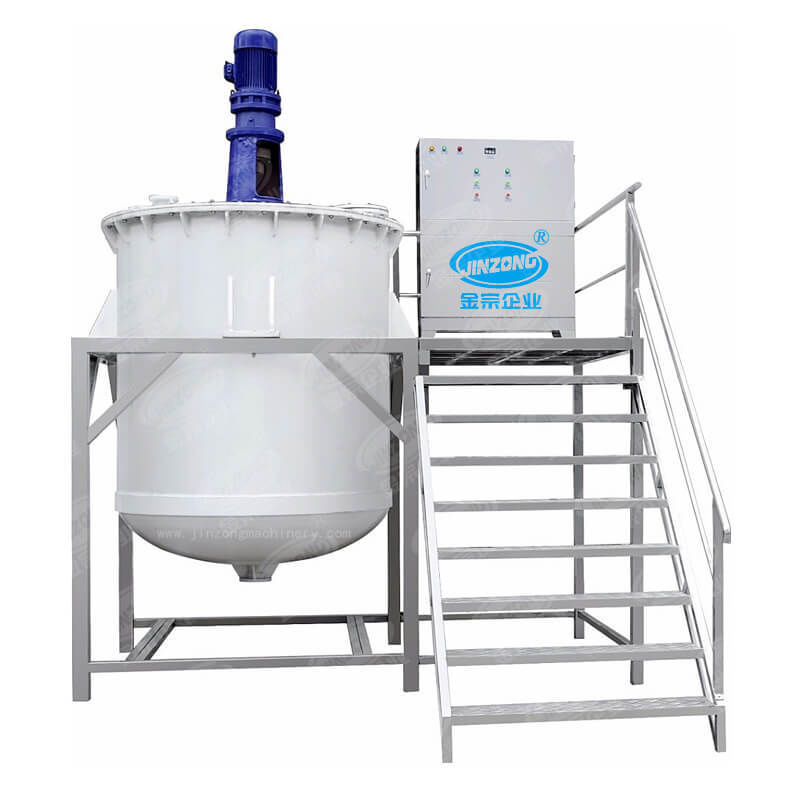Guangdong Jinzong Machinery Co., Ltd.
Contact Sales at JuJiao.
There are many choices when it comes to selecting a high quality mixing tank or vessel material. There are two main types of mixing tanks, plastic and metal. Poly mixing tanks include High Density Polyethylene (HDPE), Polypropylene (PP), Polyvinylidene (PVDF) and Teflon (PTFE). Metal tanks are usually 304 Stainless Steel, 316L Stainless Steel, Hastelloy C and other exotic metals. We will be focusing on selecting tanks for sanitary or food grade applications which require approval from the FDA.
non metallic custom blending system chromotography-mixer-design
The main parameters considered in mixing tank or vessel selection are contents, corrosion resistance, volume, temperature, location and other conditions. Plastic mixing vessels offer advantages over steel mixing tanks including cost, weight, rapid fabrication time compared to stainless steel and the ability to see liquid level. Metal tanks are more resistant to cracking and temperature effects but they require polishing of the base metal and welds and so the cost to manufacture is typically much higher than plastic tanks. If you need pressure or vacuum rating, then it’s an easy choice for wholesale stainless steel mixing tank. Certain critical heating and cooling applications also would point to a jacketed stainless process vessel. Poly tanks in PP and PVDF are USP VI rated, so they are very common for use in DI and RO ultrapure water systems and biopharma mixing applications such as buffer prep, media prep, chrome slurry agitation, etc.

Jinzong is a supplier of stainless and poly mixing tanks and mixing vessels to support the industrial mixers and agitators we specialize. With focus on the biopharm and sanitary mixer users, we offer all stainless sanitary polished tanks, sanitary high viscosity blending equipment and biotech ready tanks and vessels. We also offer FDA and USP VI plastic tanks and plastic tank mixer packages including stainless tank stands.
Jinzong specializes in custom fabricated sanitary mixing impellers in many configurations. Mixer and tank polishing, passivation, and electropolishing are services offered, as well as agitator impeller repairs and retrofits.
TYPES OF POLY VESSELS AND METAL VESSELS FOR AGITATION
POLY MIXING TANKS
POLYETHYLENE – PE TANK
FDA Resin White Translucent FDA 21 CFR177.1520 Linear PE tanks offer very good chemical resistance and stress-crack resistance. The operating temperature is from 140 F (60 C) down to -94 F (70 C). HDPE has good impact resistance and can be used for sanitary conditions. These tanks are typically used for caustics, metal finishing, plating and brine. Strong oxidizing agents, aromatic hydrocarbons and solvents should be avoided. PE we offer is an FDA approved resin.
Fluorinated PE tanks are often used for ultra pure water storage where ozone is used for sterilization. Cross linked PE is not typical for sanitary use so we generally do not offer that.
PP tanks offer very good chemical resistance and excellent stress-crack resistance. It’s operating temperature is from 220 F (104 C) down to 32 F (0 C). It only has a fair impact resistance and can be used for sanitary applications. PP mixing tanks are good for many organic chemicals and etching chemicals. Strong oxidizing agents and aromatic or chlorinated hydrocarbons should be avoided.
PVDF tanks offer superior resistance to inorganic acids, strong oxidizing agents and halogenated compounds. PVDF tanks also offer excellent resistance to stress-crack but only fair resistance to impacts. It has a temperature operating range of 230 F (110 C) down to -40 F (-40 C)
TEFLON – PTFE BLENDING VESSEL
PTFE tanks offer superior chemical and corrosion resistance. PTFE also has a wide range of temperatures from 260 C down to -270 C. PTFE is an excellent material for sanitary applications as it is inert but also is more costly. PTFE is not as strong as other plastics but can be obtained with fillers to increase its physical strength.
Copyright © 2025 Guangdong Jinzong Machinery Co., Ltd. | All Rights Reserved
We are here to help you! If you close the chatbox, you will automatically receive a response from us via email. Please be sure to leave your contact details so that we can better assist